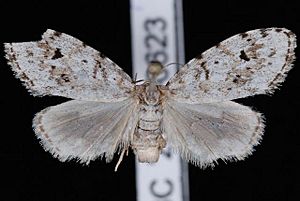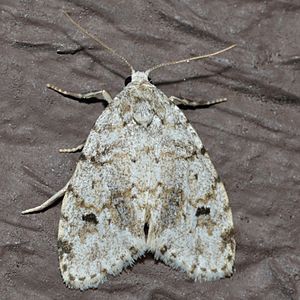Little white lichen moth facts for kids
Quick facts for kids Little white lichen moth |
|
|---|---|
 |
|
 |
|
| Scientific classification |
|
| Kingdom: | Animalia |
| Phylum: | Arthropoda |
| Class: | Insecta |
| Order: | Lepidoptera |
| Superfamily: | Noctuoidea |
| Family: | Erebidae |
| Subfamily: | Arctiinae |
| Genus: | Clemensia |
| Species: |
C. albata
|
| Binomial name | |
| Clemensia albata Packard, 1864
|
|
| Script error: The function "autoWithCaption" does not exist. | |
| Synonyms | |
|
|
Script error: No such module "Check for conflicting parameters".
The little white lichen moth (scientific name: Clemensia albata) is a small and interesting moth. It belongs to a large family of moths called Erebidae. This moth was first described by a scientist named Alpheus Spring Packard in 1864. You can find it in many parts of North America.
Contents
Where Does This Moth Live?
This moth lives across eastern North America. Its home stretches west through the boreal forests of Canada. It can even be found in southeastern British Columbia. Along the Pacific Coast, its range goes south to Monterey Bay in west-central California.
What Kind of Places Do They Like?
Little white lichen moths prefer moist forests. This includes coastal rainforests, where it rains a lot. They also live in oak woodlands and mixed hardwood forests. These are forests with different kinds of trees.
What Does the Little White Lichen Moth Look Like?
The front wings of this moth are about 10 to 11 millimeters long. That's roughly the length of a fingernail! These wings are a pale white color. They are also mixed with brown-grey shades. You might see tiny darker spots, like pepper, on them.
Hindwings and Flight Time
The back wings, called hindwings, are mostly whitish. They often have light grey smudges. Adult moths are usually seen flying from late June to early September. This means you can spot them during the summer months.
What Do Little White Lichen Moths Eat?
The young moths, called larvae or caterpillars, have a special diet. They mostly eat lichens that grow on trees. Lichens are like a mix of fungus and algae. They especially like lichens found on conifer trees, like pine or spruce. Sometimes, they also eat algae.
Different Kinds of Little White Lichen Moths
Scientists have identified a few different types, or subspecies, of the little white lichen moth. These are slight variations within the same species.
- Cissura albata albata
- Cissura albata umbrata Packard, 1872

